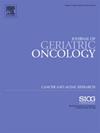老年病学评估和基于老年病学 8 的针对性干预措施对老年癌症患者生活质量的影响。
IF 3
3区 医学
Q3 GERIATRICS & GERONTOLOGY
引用次数: 0
摘要
导言:根据国际老年肿瘤学会(International Society for Geriatric Oncology)的建议,老年医学八项评估(Geriatric-8,G8)和老年医学评估(Geriatric assessment,GA)均可评估虚弱程度,并有助于提供适当的干预措施。本研究的主要目的是评估基于 G8 和 GA 的干预措施对老年癌症患者生活质量(QOL)的影响:这是一项前瞻性研究,研究对象为年龄≥70岁的癌症患者。在研究开始时进行G8、GA和欧洲癌症研究和治疗组织生活质量问卷(EORTC QLQ-C30)。研究人员提供了有针对性的干预措施。三个月后,对需要干预的患者再次进行 EORTC QLQ-C30 随访。研究的主要结果是比较老年干预前后的 EORTC QLQ-C30 评分:结果:共收集了 230 名患者。中位年龄为 74 岁(范围:70-90)。根据 GA,11% 的患者被归类为体弱者,58% 的患者被归类为前期体弱者,31% 的患者被归类为体格健壮者。共有 79% 的患者 G8 评分低于 14 分。体弱前期、体弱和 G8 评分≤14 分的患者的 EORTC QLQ-C30 功能基线评分较低,而 EORTC QLQ-C30 症状评分较高(p 14.(危险比:2.54 95 % CI 1.46-4.43,P = 0.001(体弱 vs 体健患者;1.72 95 % CI 1.18-2.53,P = 0.005(体弱前 vs 体健患者;1.51 95 % CI 1.05-2.18,P = 0.03(G8 ≤ 14 vs >14)。建议对 144 名患者进行老年肿瘤学(GO)干预,其中 104 名患者完成了第二次 EORTC QLQ-C30。这些患者在 EORTC 情绪和社会功能领域均有明显改善(平均差异 + 4.6,p 讨论):由多学科 GO 服务提供的基于 GA 的针对性干预改善了接受癌症治疗的老年患者的多个 QOL 领域。本文章由计算机程序翻译,如有差异,请以英文原文为准。
Impact of geriatric assessment and Geriatric 8-based targeted interventions on quality of life in older adults with cancer
Introduction
Both Geriatric-8 (G8) and geriatric assessment (GA) assess frailty and facilitate providing appropriate interventions as recommended by the International Society for Geriatric Oncology. The main objective of this study is to evaluate the impact of G8 and GA-based interventions on the quality of life (QOL) of older adults with cancer.
Materials and Methods
This is a prospective study of patients with cancer aged ≥70 y. A G8, GA, and a European Organisation for Research and Treatment of Cancer Quality of Life Questionnaire (EORTC QLQ-C30) was performed at study entry. Targeted interventions were offered. After three months, a follow-up EORTC QLQ-C30 was repeated for patients who required interventions. The study's primary outcome measure was a comparison of pre-and post-geriatric intervention EORTC QLQ-C30 scores.
Results
Two hundred thirty patients were accrued. Median age was 74 y (range:70–90). Based on the GA, 11 % were classified as frail, 58 % as pre-frail, and 31 % as fit. A total of 79 % had a G8 scores ≤14. Patients who were pre-frail, frail, and those with G8 ≤ 14 had lower baseline EORTC QLQ-C30 function scores and higher EORTC QLQ-C30 symptom scores (p < 0.05). They also had significantly shorter overall survival (OS) compared to fit patients or those with G8 > 14. (hazard ratio: 2.54 95 % CI 1.46–4.43, p = 0.001 for frail vs fit patients; 1.72 95 % CI 1.18–2.53, p = 0.005 for pre-frail vs fit patients; 1.51 95 % CI 1.05–2.18, p = 0.03 for G8 ≤ 14 vs >14). Geriatric oncology (GO) interventions were suggested for 144 patients with 104 patients completing a second EORTC QLQ-C30. These patients reported significant improvements in the EORTC emotional and social functioning domains (mean difference + 4.6, p < 0.001 and + 12.3 p < 0.001, respectively), a significant reduction in the EORTC symptom scale of pain, insomnia, constipation, and financial difficulties (mean difference − 5.8 p = 0.003, −8.3 p < 0.001, −9.0 p < 0.001, and − 6 p = 0.01), with no significant deterioration in other QOL domains.
Discussion
GA-based targeted interventions delivered by a multidisciplinary GO service improved multiple QOL domains in older adult patients undergoing cancer treatment.
求助全文
通过发布文献求助,成功后即可免费获取论文全文。
去求助
来源期刊

Journal of geriatric oncology
ONCOLOGY-GERIATRICS & GERONTOLOGY
CiteScore
5.30
自引率
10.00%
发文量
379
审稿时长
80 days
期刊介绍:
The Journal of Geriatric Oncology is an international, multidisciplinary journal which is focused on advancing research in the treatment and survivorship issues of older adults with cancer, as well as literature relevant to education and policy development in geriatric oncology.
The journal welcomes the submission of manuscripts in the following categories:
• Original research articles
• Review articles
• Clinical trials
• Education and training articles
• Short communications
• Perspectives
• Meeting reports
• Letters to the Editor.
 求助内容:
求助内容: 应助结果提醒方式:
应助结果提醒方式:


